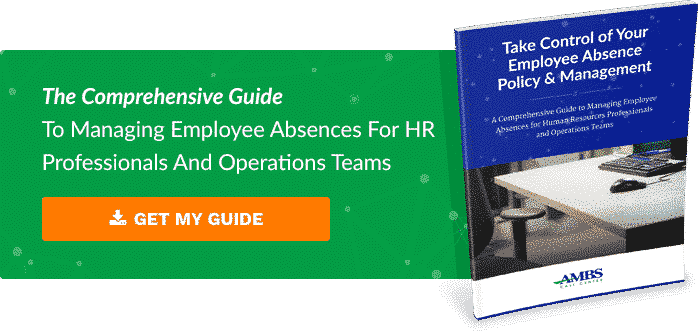
Unless you work in health care, you probably aren’t particularly excited about dealing with sick people all day.
But most human resource managers do have to deal with illnesses, at least where their employees are concerned. Whether an organization has five employees or 500, having someone out anytime for health reasons often can have an impact on everyone’s daily production and workloads.
At the same time that managers may not be overly excited about any employees calling in sick, you also don’t want to force them to come into work either if they’re not feeling well.
Want to minimize costs from employee absenteeism? Download our free eBook and take control of your employee absence policy!
They likely won’t be performing at their best, they could take longer to get up to full speed if they can’t stay home and have some quality rest, and they also could potentially infect other co-workers, clients or customers, resulting in even more production disruptions and absenteeism in your workforce in the future.
Plus, there are plenty of laws on the books guaranteeing most employees a certain number of hours of sick time. Deliberate violations of these rules by managers focused only on ensuring uninterrupted production can backfire in big ways, including messy lawsuits.
All of these factors can make managers eager for ways to outsource aspects of their ‘calling in sick’ process. An employee call-off hotline, for instance, can provide clear details from a trained, personable service about which employees called to say they’re staying home for health reasons.
This service also can provide an easy and consistent way for employees to alert their boss that they won’t make it in on any given day. Managers will still have to juggle schedules and workloads but this sort of service can make things easier for employees and for employers.
Some benefits of an employee call-off service include:
1. Clear procedure.
![]() When an employee realizes they’re too sick to come in, they may not know who to tell and how to make sure the right person gets the message, especially after hours. Sick employees have been known to call co-workers, security guards, supervisors or general voice mailboxes hoping that somehow a message will get through to their correct supervisor.
When an employee realizes they’re too sick to come in, they may not know who to tell and how to make sure the right person gets the message, especially after hours. Sick employees have been known to call co-workers, security guards, supervisors or general voice mailboxes hoping that somehow a message will get through to their correct supervisor.
This strategy may not always be successful, and if there’s a breakdown anywhere in the chain, it can result in unhappy, uninformed supervisors wondering what to do about the no-show.
But with a call-off service, employees can call a toll-free number, speak to an actual person and share clear details about what’s happening and how long they think they’ll be out. The information about the absence or tardy is time stamped and is relayed to the proper person hopefully in enough time to make arrangements for their absence.
2. Saving the manager from having to investigate the absence.
![]() Managers hate wondering where missing employees are. If they don’t get an email, voice message or text notifying them about someone’s absence, they may want to try to track that person down by calling or texting, asking co-workers, or even looking for general voicemails or emails.
Managers hate wondering where missing employees are. If they don’t get an email, voice message or text notifying them about someone’s absence, they may want to try to track that person down by calling or texting, asking co-workers, or even looking for general voicemails or emails.
In cases where messages are passed along from several sources, details could easily become garbled or incomplete. Tracking the employee down in person, such as visiting their home to check if they’re OK, may be a challenge for people living in larger communities, and may even go beyond the responsibilities of typical managers and violate their privacy.
The matter can be solved easily with an email from the call-off service saying, “X employee called in sick tomorrow.” This info allows them to start focusing on making sure production goes as scheduled rather than taking more time out of their schedule.
3. Giving managers more time to plan.
![]() Finding out that one employee is out sick, or worse, several of them, can be a tough start to anyone’s day, especially if the absences have a critical impact on workflow. It also can be a challenge and it is hard to switch around workloads or other people’s schedules at the last minute.
Finding out that one employee is out sick, or worse, several of them, can be a tough start to anyone’s day, especially if the absences have a critical impact on workflow. It also can be a challenge and it is hard to switch around workloads or other people’s schedules at the last minute.
But finding out this news earlier can provide more time to call in extra help or adjust daily workflow especially if the employee estimates that they could be out for several days if they believe they have a more severe illness.
4. Maintaining accurate paperwork.
![]() Data on employee absences collected from a call-off service is able to stay together, rather than various sticky notes or emails whenever that employee calls in sick. This can also alert a manager about possible behavioral trends, chronic problems or even how they’re doing on their annual allotment of sick leave hours.
Data on employee absences collected from a call-off service is able to stay together, rather than various sticky notes or emails whenever that employee calls in sick. This can also alert a manager about possible behavioral trends, chronic problems or even how they’re doing on their annual allotment of sick leave hours.
This also can provide details to any auditors, compliance officers or oversight organizations that everyone’s hours and benefits are being properly and clearly administered and documented.
5. Prevents lost messages.
Leaving a voicemail when sick or asking a colleague to relay a message could run the risk of details being lost, garbled or incomplete. Especially when that voicemail goes into a general mailbox for all supervisors, and you’re left scratching your head asking “Which Joe on second shift is sick? There are 4. At least that didn’t sound like my guy… man I’ll have to call him back.”
An absence call-out line will gather consistent data whenever anyone calls. This information will include a quick summary of the health situation, how long they think they’ll be out, and their contact information. There won’t be any medical diagnoses given or requested, however, HR Managers will have a full picture of the situation without calling the employee back. And, like we talk about in our employee call out line FAQ article, you keep this data for up to 7 years with Ambs Call Center's employee reporting service.
6. Offering usefulness and protection to employees.
![]() Rather than hoping “someone” gets the message in time, the sick employee notifying the call-off service will be assured that their message will reach the right person. They’ll also receive a confirmation number.
Rather than hoping “someone” gets the message in time, the sick employee notifying the call-off service will be assured that their message will reach the right person. They’ll also receive a confirmation number.
If a manager ever has questions or forgets that the employee called in sick, all the employee has to do is produce the number.
7. Reduces potential abuses.
![]() Having someone is available around the clock to handle all calls about illness makes it significantly harder for an employee to claim “I tried to call and couldn’t get through,” or “I left a message with someone but don’t remember who.” It also can eliminate people trying to use more than their legal number of hours if these kinds of abuses are taking place.
Having someone is available around the clock to handle all calls about illness makes it significantly harder for an employee to claim “I tried to call and couldn’t get through,” or “I left a message with someone but don’t remember who.” It also can eliminate people trying to use more than their legal number of hours if these kinds of abuses are taking place.
Closing possible loopholes potentially can have more people in the office as well at any given time, improving production.
Overall, the modern manager has an awful lot on their plate so worrying about sick employees shouldn’t always be on their priority list. Whether you’re a compassionate boss who doesn’t like it when anyone on your team is ill, an infection-conscious boss trying to prevent possible epidemics, or even a production-focused manager, you can benefit from the services of an Employee Call-Off Service.
Aaron Boatin is President of Ambs Call Center, a virtual receptionist and telephone answering service provider. His passion is helping clients' businesses succeed. Melding high tech with high touch to provide the best customer service experience for clients is his core focus.
Topics:


